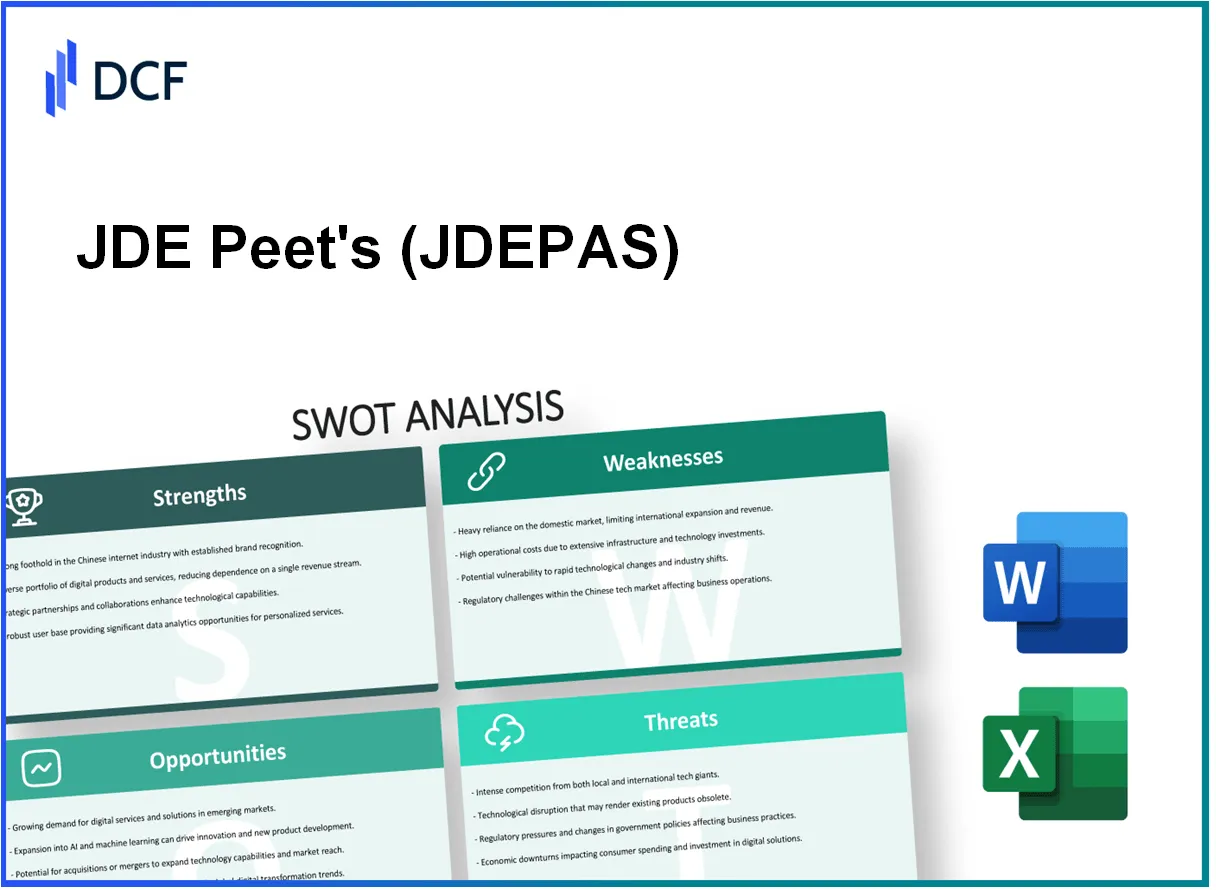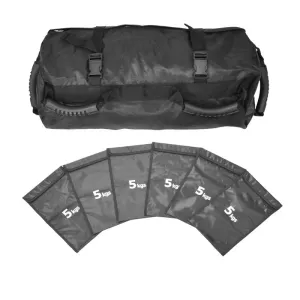In the dynamic world of the coffee and tea industry, JDE Peet's N.V. stands as a formidable player, boasting an impressive global presence and a diverse range of products. But what truly sets this company apart? Through a comprehensive SWOT analysis, we unravel the strengths that fuel its growth, the weaknesses that challenge its strategy, the opportunities waiting to be seized, and the threats lurking in the competitive landscape. Dive deeper to discover how JDE Peet's navigates this complex terrain and positions itself for future success.
JDE Peet's N.V. - SWOT Analysis: Strengths
JDE Peet's N.V. enjoys strong global brand recognition in the coffee and tea industry, leveraging iconic brands such as Jacobs, Gevalia, Douwe Egberts, and Peet's Coffee. As of 2022, the company reported that its brands were present in over 100 countries, contributing to a total revenue of approximately €7.6 billion.
The company's diverse product portfolio caters to various consumer preferences, including ground coffee, instant coffee, and coffee pods. In the latest financial reports, JDE Peet's indicated that its coffee pods segment saw a year-on-year growth of 10%, reflecting the increasing demand for convenience among consumers.
JDE Peet's has established an extensive distribution network across multiple channels. The company has partnered with major retailers, online platforms, and food service operators. As of the latest update, JDE Peet's products are available in more than 200,000 points of sale worldwide, showcasing their significant market presence.
Innovations in sustainable coffee sourcing and production practices are a cornerstone of JDE Peet's operational strategy. The company is committed to sourcing coffee sustainably, aiming for 100% of its coffee supply to be sustainably sourced by 2025. They have also invested in various programs, including financing local farmers and contributing to environmental initiatives, positioning themselves as a leader in corporate responsibility.
JDE Peet's financial performance is robust, with key profitability metrics illustrating its strength in the market. For the fiscal year 2022, the company reported an adjusted EBITDA of approximately €1 billion, achieving a margin of 13.5%. The net income for the same period was around €700 million, reflecting an increase from the previous year.
| Metric | 2022 Figures | 2021 Figures | Growth (%) |
|---|---|---|---|
| Total Revenue | €7.6 billion | €7.3 billion | 4.1% |
| Adjusted EBITDA | €1 billion | €950 million | 5.3% |
| Net Income | €700 million | €650 million | 7.7% |
| Coffee Pods Segment Growth | 10% | 8% | 2% |
JDE Peet's N.V. - SWOT Analysis: Weaknesses
High dependency on raw material prices, especially coffee beans: JDE Peet's is significantly affected by the volatility of coffee prices, which can fluctuate based on weather conditions, global supply and demand dynamics, and political instability in producing countries. In 2022, coffee prices reached an average of $4.60 per pound, compared to $1.55 in 2020. This fluctuation directly impacts JDE's profit margins, as coffee constitutes a major part of its cost structure.
Limited presence in emerging markets compared to competitors: While JDE Peet's has a strong footprint in Europe and North America, its market penetration in emerging markets like Asia-Pacific and Latin America remains relatively low. For instance, in 2021, JDE Peet's generated approximately 15% of its total revenue from these regions, whereas leading competitors such as Nestlé reported 40% of their revenue from rapidly growing markets. This limited exposure reduces the growth potential in high-demand areas.
Vulnerability to fluctuations in exchange rates: As a global player, JDE Peet's revenue is subject to currency fluctuations. In 2022, it reported foreign exchange losses totaling approximately €25 million due to volatility in currencies such as the Brazilian Real and Colombian Peso, which significantly impacted operations and financial reporting. The company's diverse geographic footprint means that adverse movements in currency exchange rates can erode international sales revenues when reported in euros.
Challenges in digital transformation and e-commerce adaptation: In an increasingly digital marketplace, JDE Peet's faces challenges in adapting its business model to e-commerce trends. Data from 2023 shows that online sales constituted 18% of total sales, which lags behind competitors like Starbucks that reported e-commerce sales at 30%. Additionally, JDE's investment in digital channels increased by only 10% year-over-year, indicating a slower pace of adaptation compared to competitors investing heavily in technology and online presence.
| Weakness | Impact | Financial Data |
|---|---|---|
| High dependency on raw material prices | Direct impact on profit margins | Averaged $4.60 per pound for coffee in 2022 |
| Limited presence in emerging markets | Reduced growth potential | 15% of revenue from Asia-Pacific and Latin America in 2021 |
| Vulnerability to exchange rate fluctuations | Foreign exchange losses | €25 million in losses due to currency volatility in 2022 |
| Challenges in digital transformation | Slow adaptation to e-commerce trends | 18% of total sales from online channels in 2023 |
JDE Peet's N.V. - SWOT Analysis: Opportunities
JDE Peet's N.V. is strategically positioned to capitalize on several key opportunities within the global coffee market. The following sections outline these potential avenues for growth and expansion.
Expansion into Emerging Markets with Growing Coffee Consumption
Emerging markets present significant growth opportunities due to the rising consumption of coffee. For instance, according to Statista, coffee consumption in Asia is projected to increase by 4.2% annually. Countries like Vietnam and India have seen notable growth in their coffee markets; Vietnam's coffee consumption was estimated at 1.8 million 60-kilogram bags in 2021, representing a 12% increase from the previous year.
Additionally, in India, the coffee market is expected to grow with a compound annual growth rate (CAGR) of 6% from 2021 to 2026, driven by a younger demographic increasingly adopting coffee culture.
Development of New Product Lines Focusing on Health and Wellness Trends
The global health and wellness food market is valued at approximately $1 trillion and is projected to reach $1.6 trillion by 2026, according to Market Research Future. JDE Peet's can align product offerings with this trend by introducing health-conscious coffee options, such as organic or functional beverages fortified with vitamins and adaptogens.
Moreover, the demand for plant-based and low-calorie products continues to rise. The global plant-based coffee market is anticipated to grow by a CAGR of 10% between 2021 and 2028.
Leveraging Technology to Enhance Direct-to-Consumer Sales Channels
Investing in e-commerce platforms can substantially increase JDE Peet's market share. As of 2022, online sales of coffee in the U.S. accounted for approximately $4.2 billion of the total coffee market, which was valued at around $45.4 billion, according to IBISWorld.
The rise of direct-to-consumer (DTC) sales models has allowed brands to improve profit margins and build stronger customer relationships. JDE Peet's can enhance its digital infrastructure to optimize customer experiences and streamline logistics for faster delivery.
Strategic Partnerships or Acquisitions to Broaden Market Reach
Strategic acquisitions have proven beneficial in the coffee industry; for instance, in 2020, JDE Peet's acquired Martinelli's Coffee, expanding its footprint in the specialty coffee segment. The global coffee market was valued at approximately $102 billion in 2021, and strategic partnerships can help JDE Peet's access new distribution channels and customer segments.
The coffee shop franchise sector is also experiencing growth. The global coffee shop market size was valued at $45.4 billion in 2022 and is expected to grow at a CAGR of 4.3% through 2027, providing ample opportunity for JDE Peet's to explore strategic alliances.
| Opportunity | Market Size/Value | Growth Rate | Year |
|---|---|---|---|
| Emerging Markets Coffee Consumption | $1.8 million bags (Vietnam) | 12% | 2021 |
| Indian Coffee Market Growth | Expected to reach $900 million | 6% | 2026 |
| Global Health and Wellness Food Market | $1 trillion | 60% | 2021-2026 |
| Global Plant-Based Coffee Market Growth | Notable increase | 10% | 2021-2028 |
| U.S. Online Coffee Sales | $4.2 billion | - | 2022 |
| Global Coffee Market Valuation | $102 billion | - | 2021 |
| Global Coffee Shop Market Size | $45.4 billion | 4.3% | 2022-2027 |
JDE Peet's N.V. - SWOT Analysis: Threats
JDE Peet's N.V. faces several significant threats in the competitive landscape of the coffee industry.
Intense Competition from Both Large Corporations and Local Players
The coffee market is characterized by intense competition. JDE Peet's competes with major corporations such as Nestlé, Starbucks, and Unilever, each holding substantial market shares. For instance, Nestlé generated CHF 94.4 billion in revenue in 2022, a testament to its strong market presence. Additionally, local players and specialty coffee brands continue to carve out market niches, stimulating further competition.
Volatility in Global Coffee Supply Due to Climate Change Impacts
Climate change poses a critical threat to coffee supply. The Arabica coffee price fluctuated significantly, reaching a high of $2.57 per pound in March 2022. According to the International Coffee Organization, coffee production is expected to decline by 25% by 2050 due to climate-related issues. This volatility can disrupt supply chains and increase costs for JDE Peet's.
Regulatory Changes Impacting Coffee Production and Distribution
Changing regulations at local, national, and international levels can impact JDE Peet's operations. For example, the European Union has implemented stricter regulations concerning sustainable sourcing practices. In 2021, coffee importers faced additional tariffs of 8% on imported coffee from specific regions, affecting cost structures and profit margins. Furthermore, compliance with environmental regulations can lead to increased operational costs.
Shifts in Consumer Preferences Towards Non-Coffee Beverages
Consumer preferences are shifting towards non-coffee beverages, presenting a challenge for JDE Peet's traditional offerings. In 2023, the global market for non-coffee beverages, including tea and alternatives, reached $500 billion, growing at a CAGR of 5.3% from 2020 to 2023. This trend has prompted competition from companies that specialize in energy drinks and herbal teas, which could dilute JDE Peet's market share.
| Threats | Impact | Statistical Data |
|---|---|---|
| Intense Competition | High | Nestlé Revenue: CHF 94.4 billion (2022) |
| Volatility in Coffee Supply | Medium to High | Arabica Price: $2.57 per pound (March 2022) |
| Regulatory Changes | Medium | Tariff Increase: 8% on imports (2021) |
| Shifts in Consumer Preferences | High | Non-Coffee Market Value: $500 billion (2023) |
JDE Peet's N.V. stands at a critical intersection, with robust strengths and promising opportunities that can propel its growth trajectory, while facing inherent weaknesses and external threats. Navigating this complex landscape will require strategic foresight and adaptability, positioning the company to capitalize on its competitive advantages in the ever-evolving coffee and tea market.












